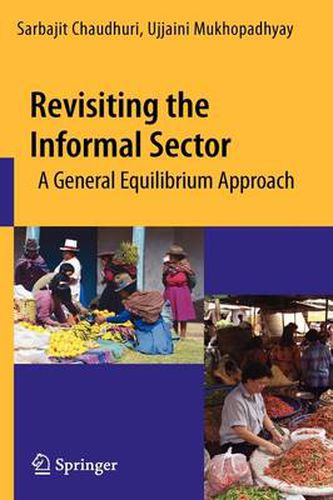Readings Newsletter
Become a Readings Member to make your shopping experience even easier.
Sign in or sign up for free!
You’re not far away from qualifying for FREE standard shipping within Australia
You’ve qualified for FREE standard shipping within Australia
The cart is loading…






This title is printed to order. This book may have been self-published. If so, we cannot guarantee the quality of the content. In the main most books will have gone through the editing process however some may not. We therefore suggest that you be aware of this before ordering this book. If in doubt check either the author or publisher’s details as we are unable to accept any returns unless they are faulty. Please contact us if you have any questions.
Informal sector has emerged as a critical element in the development process of theentiredevelopingworld.Itisnowwellrecognisedthatsuchasectorprovides employmenttothemajorityoftheworkforceinthepoorcountries.Sometimesthe shareofemploymentintheseactivitiesgoeswaybeyond50%oftotalemployment. Informalusuallyreferstoextra-legalandnon-recordedeconomicactivitiesandcan captureawholearrayofdiverseoccupations,productsandservices.Development Economicsasadisciplinehasnottreatedsuchtopicswithadequatereverence.Text booksdealingwitheconomicdevelopmentdonothaveexclusivesectionsdevoted to the discussion of growth, dynamics and sustenance of informal activities. In particular how informal transactions in?uence employment, output, productivity, wagesandenvironmentisseldomdiscussedformallyintermsofanalyticalm- els. Informal sector does not operate in a vacuum. Thus the general equilibrium linkages involving the informal and formal activities also need to be explored in detailifdevelopmentpoliciesaretobeproperlyevaluated.Thisvolumesuccessfully addressesboththeseissuesanddoesitwithcompetenceandrigour. Authorsofthisvolumehavebeenworkingonthefrontiersofdevelopmentpolicy researchinthecontextofopendevelopingeconomies,focusingmainlyongeneral equilibriumimplicationsofsuchpolicies.Infactoneoftheauthorshaswrittenat length on informal credit market. Sustained research programme on such a topic ofgreatsigni?cancelendscredibilitytothisvolume.Itisalsohightimethats- eralinternationalpublicationsoftheauthorsinrelatedareasareputtogetherina comprehensivemonograph.Iamde?nitesuchavolumewillbeveryhelpfultos- dents, researchers, policy makers and anyone seriously interested in development economics. CentreforStudiesinSocialSciences,Calcutta,India SugataMarjit vii Preface In the last few decades informal sector has drawn serious cognizance among economists in view of its role in developing economies. The earlier contention that the informal sector epitomises the ‘residual’ sector or a sector of last resort has been belied by a plethora of evidences indicating its dynamic character and its instrumental role in ameliorating unemployment and in propelling the dev- oping economies towards growth and prosperity. This conceptual metamorphosis regarding the informal sector has stimulated revived interest in the phenomenon amongdevelopmenteconomists.Thereexistmanybooksthatdealwiththesector analyticallyorempirically. However, the theoretical analysis of the different aspects of the sector is equally important, especially for formulation of appropriate policy prescriptions. Comparativestaticresults,inmanycases,divergefromtheconventionalresults.We noticedthatalthoughvariousauthorshavepublishedtheoreticalpapersindifferent journals, there are very few books that try to understand the informal sector in a theoreticalframework.Thislacunainculcatedinusaninteresttowritethisbook.
$9.00 standard shipping within Australia
FREE standard shipping within Australia for orders over $100.00
Express & International shipping calculated at checkout
This title is printed to order. This book may have been self-published. If so, we cannot guarantee the quality of the content. In the main most books will have gone through the editing process however some may not. We therefore suggest that you be aware of this before ordering this book. If in doubt check either the author or publisher’s details as we are unable to accept any returns unless they are faulty. Please contact us if you have any questions.
Informal sector has emerged as a critical element in the development process of theentiredevelopingworld.Itisnowwellrecognisedthatsuchasectorprovides employmenttothemajorityoftheworkforceinthepoorcountries.Sometimesthe shareofemploymentintheseactivitiesgoeswaybeyond50%oftotalemployment. Informalusuallyreferstoextra-legalandnon-recordedeconomicactivitiesandcan captureawholearrayofdiverseoccupations,productsandservices.Development Economicsasadisciplinehasnottreatedsuchtopicswithadequatereverence.Text booksdealingwitheconomicdevelopmentdonothaveexclusivesectionsdevoted to the discussion of growth, dynamics and sustenance of informal activities. In particular how informal transactions in?uence employment, output, productivity, wagesandenvironmentisseldomdiscussedformallyintermsofanalyticalm- els. Informal sector does not operate in a vacuum. Thus the general equilibrium linkages involving the informal and formal activities also need to be explored in detailifdevelopmentpoliciesaretobeproperlyevaluated.Thisvolumesuccessfully addressesboththeseissuesanddoesitwithcompetenceandrigour. Authorsofthisvolumehavebeenworkingonthefrontiersofdevelopmentpolicy researchinthecontextofopendevelopingeconomies,focusingmainlyongeneral equilibriumimplicationsofsuchpolicies.Infactoneoftheauthorshaswrittenat length on informal credit market. Sustained research programme on such a topic ofgreatsigni?cancelendscredibilitytothisvolume.Itisalsohightimethats- eralinternationalpublicationsoftheauthorsinrelatedareasareputtogetherina comprehensivemonograph.Iamde?nitesuchavolumewillbeveryhelpfultos- dents, researchers, policy makers and anyone seriously interested in development economics. CentreforStudiesinSocialSciences,Calcutta,India SugataMarjit vii Preface In the last few decades informal sector has drawn serious cognizance among economists in view of its role in developing economies. The earlier contention that the informal sector epitomises the ‘residual’ sector or a sector of last resort has been belied by a plethora of evidences indicating its dynamic character and its instrumental role in ameliorating unemployment and in propelling the dev- oping economies towards growth and prosperity. This conceptual metamorphosis regarding the informal sector has stimulated revived interest in the phenomenon amongdevelopmenteconomists.Thereexistmanybooksthatdealwiththesector analyticallyorempirically. However, the theoretical analysis of the different aspects of the sector is equally important, especially for formulation of appropriate policy prescriptions. Comparativestaticresults,inmanycases,divergefromtheconventionalresults.We noticedthatalthoughvariousauthorshavepublishedtheoreticalpapersindifferent journals, there are very few books that try to understand the informal sector in a theoreticalframework.Thislacunainculcatedinusaninteresttowritethisbook.